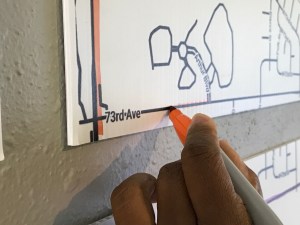We’ve all been there. A new chance or opportunity arises and we start to hope. We dream. We love thinking about the possibilities. We take the chance. We apply for the job, share our feelings with the girl, put our name in the hat for a promotion –and we wait. If you’re a person of faith, you might even take a season to pray about the possibilities. You might also use the phrase, “it’s God’s will…” So you apply. Pray.
There is a part of life that happens to everyone. No one likes to talk about it. We all put on our happy faces and pull up our big boy or big girl pants (a phrase no guy should use outside of this blog).
And wait.
Then the door is shut and we’re told no. We didn’t get the promotion, new job or the girl doesn’t want to go out on a date with us.
One of the biggest hurdles in moving forward when we are disappointed is the mental game we have to play. We dreamed up all the possibilities. We thought of what our life would be like if this or that happens and then we are left lacking. We are left realizing, not today. That possible job isn’t God’s will. You weren’t chosen.
The underlying hurt of disappointment is the reality that you weren’t chosen. No one comes out and says that, but it’s the truth. The company or girl chose someone other than you. That reality is painful.
It can be crushing. It can derail us, but it doesn’t have to.
As I reviewed my 38 years of life, I realized there had been several moments that could have crushed me; however, I learned a life lesson by watching my mom. She continually moved forward in spite of being disappointed time after time. If anyone should have given up, it would have been my mom.
Her father died when she was just 2 years old. Her mom died when she was 6 years old. Her aunt and uncle raised her. The man she married (my dad) divorced her after admitting he had been having an affair (if not multiple). My mom worked several jobs at one time to provide for our family. Watching her resolve, I’ve learned several lessons that have helped me in my times of disappointment.
It’s easy to say it doesn’t have to derail us, but in reality, it’s difficult to live out. So how can we keep the disappointment from crushing us or wrecking us?
1. Don’t let it crush you.
Sounds simple, but you can mature.
My friend, Lynn, said that she pauses so that she can respond, not react. There is so much wisdom in Lynn’s words. Respond instead of reacting. It’s not easy or natural, but it’s the mature thing to do.
How often have you sent back an email “REPLY ALL” and added a few names or maybe even put a person’s name in the BCC line (nice move, the original audience will never know)? You react and in bold all caps unleash your reaction through the email. And even worse, actually clicked ‘send’ without reading through it. That’s a reaction.
Take a moment. BREATHE. Decide how you WILL respond. One of the most difficult lessons I’ve had to learn and relearn is this. The way I leave a situation and how I behave, is how someone is going to remember me. So, if I react and unleash a fury of insults at them, ten years later that’s exactly how I will be remembered.
In the Hebrew Scriptures, there is a guy named Joseph. Joseph’s life is one disappointment after another. His brothers want to kill him, but they settle by selling him into slavery. He’s falsely accused and thrown into prison. In prison, he helps a friend out, but ultimately he’s forgotten. His perspective on life is life-giving for sure. Instead of allowing the pain and hurt of disappointment to crush him, Joseph decides to move past the disappointment. He chooses to remain helpful. When he’s finally called upon to help Pharaoh, he doesn’t unleash his fury of hurtful words and ‘burn any potential bridges.’ He remains humble and useable.
I think we see someone’s real character once they are told no. It’s easy to act mature or act like we have it all together. It’s more of a challenge, however, to remain that way once we’ve been told “no”.
2. Learn from the process and move forward.
Evaluated experience is how you mature and reach potential. John Maxwell says, “Experience isn’t the best teacher, evaluated experience is.”
I’m not sure what you need to learn from or what your specific experience might be, but I want to point you down the right path. (Kind of like Obi-Wan or Yoda pointing Luke Skywalker in the right way or like the Fairy Godmother helping Cinderella.) Here’s the thing that guides realize in this process. Guides might have some experience that might help you. Part of that experience is that you have to evaluate your experience.
Albert Einstein is usually credited in saying, “The definition of insanity is doing the same thing over and over again and expecting a different result.”
Be honest with yourself. Are you continually doing the same thing over and over again hoping for different results? Are you changing jobs, schools or environments but not changing your behavior and habits?
My friend, Nick, wisely said on a recent Facebook post that he stops and thinks about why he is disappointed. He thinks about who he’s disappointed in. Is it someone else or is he disappointed in himself?
In the process of moving forward, I’d encourage you to ask those questions. Be honest with yourself. We tend to lie about ourselves making ourselves out to look better than we are. The problem with that is that it hinders our progress.
In my own life, I see my years as “Before Maturity” and “After Maturity”. There were so many situations where I kept myself from maturing because it felt better to blame others for my disappointment. I would unleash a fury of insults or backhanded compliments towards others who left me disappointed.
I used to explain away my brash vulgar way of speaking as ‘it’s just who I am” or “if you don’t like it, too bad”. I would make myself out to appear better than I was in situations.
Have you ever walked around with your zipper down? That’s just what it felt like. Everyone else could see my downfall but I couldn’t see it myself. I just needed someone to tell me. I needed a helpful guide who would say to me, “Hey Jackwagon, your zipper is down!”.
Disappointment happens to us all. There is no shame in admitting we are disappointed. There is shame in lying to ourselves to make others look bad and ourselves look better.
At the same time, I realized for me to be disappointed means that someone had to be the ‘bad guy or lady’. I was never going to allow myself to be the bad guy, so the other person became the bad guy.
I would explain situations away like, “They can’t accept me for speaking the truth” or “I guess they’re too weak to have someone challenge them”.
I’d encourage you not to do that. Avoid that at all cost. The sooner you can be honest with yourself and eventually others, the sooner you’ll be able to indeed move past the moment of disappointment.
Evaluate your experience. If you are a manager that struggles at retaining great employees and you’re disappointed because of the employee turnover, maybe it’s not the company, pay or the employees. Perhaps the issues lie with how you lead. It could be in the way you communicate. Maybe the problem lies with you.
3. Take a moment and mourn it.
Growing up, I was taught by either society or my mom’s example to put one foot in front of the other no matter what might have caused my pain. While I admire this trait, especially watching it lived out by my mom, in my life this was coupled with not processing and not allowing my emotions even to approach the surface. I would bury them in business, productivity and ice cream. Lots of ice cream.
If I walked away from a situation and was disappointed, I believed that I didn’t have time to mourn the pain of that moment. Life was moving forward and so should I.
The problem was that I was carrying around a load of bricks that I didn’t realize. It was as if every time I was disappointed, I picked up a brick and put in my backpack of life. After a while it got heavy. Others saw it in my life. I didn’t however.
It wasn’t until I was 27 years old that I realized I had this backpack. I was talking with my counselor about all the times I had been let down or disappointed. He pointed out the weight of those moments.
Allow the decision that left you disappointed to affect you. Process it, journal it and move on. Set a deadline and after that time, mentally move on.
Several years ago, I applied for a job I really wanted. The job was within the same organization I was currently working in but in another department. The decision makers seemed to be excited about me applying for it.
After applying and interviewing twice, I waited to hear back from them.
After about three weeks, I finally heard back. I didn’t get the job.
My response must have caught the person on the other end of the desk off guard. He was shocked that I didn’t react. I merely responded, “thanks for the opportunity.” I genuinely meant it. I was disappointed, but I realized there was nothing else I could do.
He asked me why I responded the way I did. When I asked him, “Would throwing a fit or whining change your mind?”, he laughed and said ‘no.’
Afterward, I processed with my wife and some wise friends. My wise friends helped me to feel the moments. I tend to push forward and find the next hill to climb. Even after an expensive counselor, I still have a habit of doing that. My friends slowed me down and allowed me to process the entire situation.
The beautiful thing that happened was that my friend suggested that I put a deadline of when I wanted to move on. I threw out a random date. After that date, anytime I began mentioning anything about not getting the job, MIke would stop me.
Let’s go back to my friend, Nick. He tracks the root cause of his disappointment. Has something from his past risen back up to affect him? Is he currently dealing with something that he can work through?
To indeed move on, we must identify who and what we are disappointed in. I’d go as far as to say you should name a person.
4. Don’t stop dreaming. Take the next chance.
You might ask, “If we are all going to be disappointed, why should we even try? What’s the point of trying if we are only going to be let down and have our feeling hurt? Shouldn’t we grab Ben and Jerry’s and dive in and eat our way to ‘happiness’?” As tempting as that sounds, I don’t believe it’s the best option for any of us. Sure diving into our favorite vice might allow us to feel better, but is that how we mature?
Diving head first into your favorite vice might result in you being dependent on that vice to function. You might end up only being able to fit into sweat pants as a result of eating all the things. You might binge drink on some New Holland Beer Barrel Bourbon and find yourself out of a job, friendless, etc. At least you’re ‘happy’ right?
Giving up isn’t the best option for you. Giving up might protect your heart from being hurt or let down. C.S. Lewis said it best.
“To love at all is to be vulnerable. Love anything and your heart will certainly be wrung and possibly be broken. If you want to make sure of keeping it intact, you must give your heart to no one, not even to an animal. Wrap it carefully round with hobbies and little luxuries; avoid all entanglements; lock it up safe in the casket or coffin of your selfishness. But in that casket-safe, dark, motionless, airless — it will change. It will not be broken; it will become unbreakable, impenetrable, irredeemable. The alternative to tragedy, or at least to the risk of tragedy, is damnation. The only place outside of Heaven where you can be perfectly safe from all the dangers and perturbations of love is Hell.”-C.S. Lewis
To advance in life, humanity must dream. It must pursue possibilities.
Dream again.
In the pursuit of making his dream come true, Thomas Edison seemingly failed to invent the light bulb. Time after time his attempt to create the light bulb failed. It wouldn’t produce light. The prototype wasn’t successful at holding the light. Finally, however, he made a prototype that kept the light. It was ultimately successful. Thomas Edison was asked how it felt to fail 1,000 times. Edison replied, ‘I didn’t fail to invent the light bulb, the light bulb took 1,000 steps to invent.’
Human history is full of leaders who should have given up. They were disappointed many times for sure. Let’s look at Abraham Lincoln for example. He lost eight elections, failed at business more than once and was heartbroken when his fiance got sick and died. He should have given up. Human history, however, wouldn’t be the same if he did. We are better off because of his pursuit of greatness.
What will human history say because of your pursuit of greatness?
Don’t allow disappointment to crush you. Take steps to mature. Take steps to move past it and improve human history.
Photo by Andre Hunter on Unsplash
Edited by @Tammy Oswalt
















